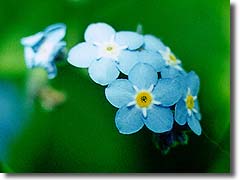The foliage and stems of local members of Boraginaceae have bristly hairs. The flower clusters are often one sided on the stem and at least slightly coiled, and at times during development resemble the scroll of a violin.
Flowers have 5 petals and 5 lobed calyx and corolla, with 5 stamens alternate to the corolla lobes.Fruit developes in a 4 lobed chamber that separates into individual dry, 1-seeded nutlets.
The Old World species have long been used as kitchen flavorings, herbal remedies, and sources of dyes. Many cultivated species are popular in gardens (such as Forget-Me-Nots, Borage and Comfrey), so a certain number of escapees may be seen around the urban fringes of Montara Mountain.
Boraginaceae species known on Montara Mountain include:
